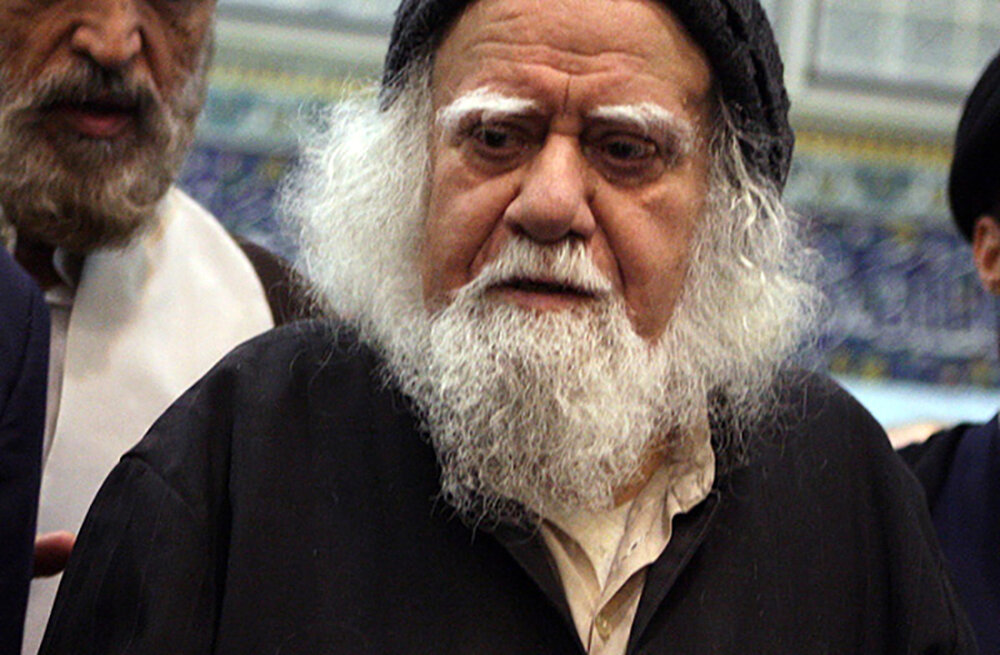Doc spotlights Islamic philosopher Mohammadreza Hakimi’s life story

TEHRAN – Filmmaker Mahmud Asadi has put top Islamic philosopher Mohammadreza Hakimi under the microscope in a documentary, the Documentary, Experimental and Animation Film Center (DEAFC) said on Monday.
Asadi was in company with Hakimi for 30 years and has conducted interviews with dozens of philosophers and experts for his documentary entitled “Cough of Canary and Stroke of Words”.
Hakimi, a top Islamic philosopher who was most famous for his studies on social justice and individual freedom in Islam, died of heart failure on August 22, 2021, at the age of 86.
The documentary covers the entire life story of the philosopher who declined any offer to be interviewed, photographed or filmed except in exceptional cases.
“In 1992, I wanted to publish a single photo of Hakimi as the founder of the Separation School [an ideology in the Shia religious science that promotes separation between the philosophical teachings and the methods of religious studies] in a magazine. He told me, ‘no, it’s unnecessary’,” Asadi said.
“Our insistence was in vain and finally, the article was published with some photos of his masters. Since then I’ve been determined to know the secret behind his solitude. Hakimi was a lonely, simple and calm man with great influence in society who was living with his canaries in a small house,” he added.
“His relations with scholars in Islamic seminaries and universities, intellectuals, heretics and even non-religious people expanded his power and influence, before the victory of the Islamic Revolution. Abdolhossein Zarrinkub invited him to teach the Nahaj-ul-Balagha at the University of Tehran for the first time; [Ali] Shariati selected him as his executor; his letter to Fidel Castro and his meeting with Che Guevara’s children, and his special regard for social justice are among the various topics in his life,” Asadi stated.
Asadi has previously directed the documentaries “Philosophy with Flavor of Chocolate” about philosopher Gholam-Hossein Ebrahimi Dinani, “Painter Poet” about the master miniaturist Mahmud Farshchian and “Phosforic Hands” about the world-renowned Iranian neurosurgeon Majid Samii.
Hakimi was born into a religious family in Mashhad, a major Iranian city, which is revered by Shia Muslims as it houses the holy shrine of Imam Reza (AS), the eighth Imam of the Shia.
His father, Abdolvahab, was respected by top businessmen in the bazaar for his honesty. Hakimi began his education in 1941. He was admitted to the Khorasan Islamic seminary six years later, spending 20 years learning Islamic sciences from top clerics such as Seyyed Abolhassan Hafezi and Sheikh Mojtaba Qazvini.
In 1969, Grand Ayatollah Sheikh Mohammed-Mohsen Razi popularly known as Aqa Bozorge Tehrani qualified him to exercise ijtihad, however, he never wore the common Muslim clerics’ attire.
He wrote over 100 books and articles on Islamic issues. “Al-Hayat” (“The Life”) is one of his greatest books written in Arabic in twelve volumes dating from 1974 to 2015.
This book is actually an encyclopedia of Islamic sciences, which holds a lofty place in the Islamic world.
“Minus Poverty” is another book written by Hakimi, which discusses his pro-justice views of economic issues in Islam.
“Based on a hadith from Imam Sadeq (AS), if one person, just one person, lives in poverty and scarcity in a society, even if in a remote village, the society cannot be considered as an Islamic one,” Hakimi had once said.
Among his credits are also “The Sun of the Occident”, “Sun Interpretation”, “The Red Wisdom” and “The Cry of Days”.
Photo: Islamic philosopher Mohammadreza Hakimi in an undated photo.
MMS/YAW
Leave a Comment